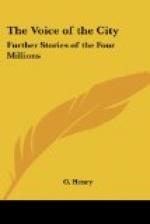On the other hand, straight lines show that Nature has been deflected. Imagine Venus’s girdle transformed into a “straight front”!
When we begin to move in straight lines and turn sharp corners our natures begin to change. The consequence is that Nature, being more adaptive than Art, tries to conform to its sterner regulations. The result is often a rather curious product—for instance: A prize chrysanthemum, wood alcohol whiskey, a Republican Missouri, cauliflower au gratin, and a New Yorker.
Nature is lost quickest in a big city. The cause is geometrical, not moral. The straight lines of its streets and architecture, the rectangularity of its laws and social customs, the undeviating pavements, the hard, severe, depressing, uncompromising rules of all its ways—even of its recreation and sports—coldly exhibit a sneering defiance of the curved line of Nature.
Wherefore, it may be said that the big city has demonstrated the problem of squaring the circle. And it may be added that this mathematical introduction precedes an account of the fate of a Kentucky feud that was imported to the city that has a habit of making its importations conform to its angles.
The feud began in the Cumberland Mountains between the Folwell and the Harkness families. The first victim of the homespun vendetta was a ’possum dog belonging to Bill Harkness. The Harkness family evened up this dire loss by laying out the chief of the Folwell clan. The Folwells were prompt at repartee. They oiled up their squirrel rifles and made it feasible for Bill Harkness to follow his dog to a land where the ’possums come down when treed without the stroke of an ax.
The feud flourished for forty years. Harknesses were shot at the plough, through their lamp-lit cabin windows, coming from camp-meeting, asleep, in duello, sober and otherwise, singly and in family groups, prepared and unprepared. Folwells had the branches of their family tree lopped off in similar ways, as the traditions of their country prescribed and authorized.
By and by the pruning left but a single member of each family. And then Cal Harkness, probably reasoning that further pursuance of the controversy would give a too decided personal flavour to the feud, suddenly disappeared from the relieved Cumberlands, baulking the avenging hand of Sam, the ultimate opposing Folwell.
A year afterward Sam Folwell learned that his hereditary, unsuppressed enemy was living in New York City. Sam turned over the big iron wash-pot in the yard, scraped off some of the soot, which he mixed with lard and shined his boots with the compound. He put on his store clothes of butternut dyed black, a white shirt and collar, and packed a carpet-sack with Spartan lingerie. He took his squirrel rifle from its hooks, but put it back again with a sigh. However ethical and plausible the habit might be in the Cumberlands, perhaps New York would




